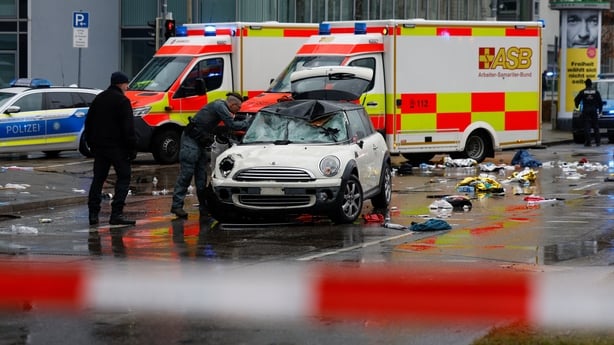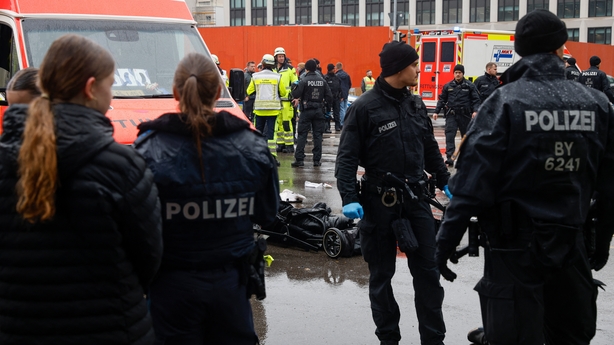At least 30 people were hurt when a car driven by an Afghan asylum seeker ploughed into a crowd in Munich in what the state premier said was probably an attack, putting security back in focus before next week's federal election.
The suspected attack came hours before international leaders including US Vice President JD Vance and Ukrainian President Volodymyr Zelensky were due to arrive in the southern German city for the Munich Security Conference.
At least 30 people were injured, some of them seriously, according to the latest policereport.
Police said a white car had approached police vehicles that were accompanying a demonstration of striking workers, before speeding up and slamming into people.
One shot was fired at the suspect and it was unclear if he was wounded, police added.
Officers detained the 24-year-old driver.
They said his motive was unclear.
The vehicle, a Mini Cooper, barrelled into a demonstration held by trade unionists, leaving a trail of victims and scattering their belongings on the street.
Police at the scene fired a shot at the battered car and detained the driver, a 24-year-old Afghan asylum seeker who was identified by German media as Farhad N.
Chancellor Olaf Scholz condemned the "awful" attack and promised severe consequences.
"From my point of view it is quite clear: this attacker cannot count on any mercy, he must be punished and he must leave the country," Mr Scholz told reporters.
Shoes, glasses and an infant stroller were left littered in the wake of the suspected attack, which follows a deadly car rampage at a Christmas market in the eastern city of Magdeburg in December.
Alexa Graef, a witness, said she was "shocked" after seeing the car drive into the crowd, "which looked deliberate".
"I hope it's the last time I see anything like that," said Ms Graef, whose office overlooks the junction where the car struck.
Police inspected the cream-coloured car used in the attack, leading sniffer dogs around the Mini.
The 24-year-old, who lived in Munich, was arrested at the scene, police said.
The authorities have "indications of an extremist motive" and the investigation had been handed over to the regional prosecutor's office, police added.

News outlet Der Spiegel, citing security sources, reported that he was believed to have posted Islamist content online before the attack.
Earlier, a fire service spokesman told AFP that several of those hurt had been "seriously injured, some of them in a life-threatening condition".
Children were also among the victims, according to local media reports.
The suspect was said to have arrived in Germany in 2016 at the height of the mass migrant influx to Europe.
His asylum request was reportedly rejected by German authorities, but he was not slated for deportation.
Bavaria state premier Markus Soeder told journalists that the incident was "just terrible" and that "it looks like this was an attack".

The CDU/CSU alliance, which polls suggest is on track to emerge as the winner of the election in just over a week, has called for tougher curbs on immigration after the recent attacks.
Under pressure on the issue even before the election was called, Mr Scholz's government had moved to make asylum rules stricter and speed up deportations, including to Afghanistan.
Mr Scholz said the returns were "complicated" to organise but that the government was "in the process of doing so in other cases... not just once, but on an ongoing basis".
This latest attack comes amid an already heated debate on immigration and security after several similar incidents, most recently in the Bavarian city of Aschaffenburg last month.
Two people were killed in a knife attack on kindergarten toddlers there, including a two-year-old boy.
After that attack police arrested a 28-year-old Afghan man who authorities say had a history of mental illness.
In December, six people were killed after a car ploughed into a Christmas market in the eastern city of Magdeburg, wounding hundreds.
A Saudi man was arrested after that attack.

